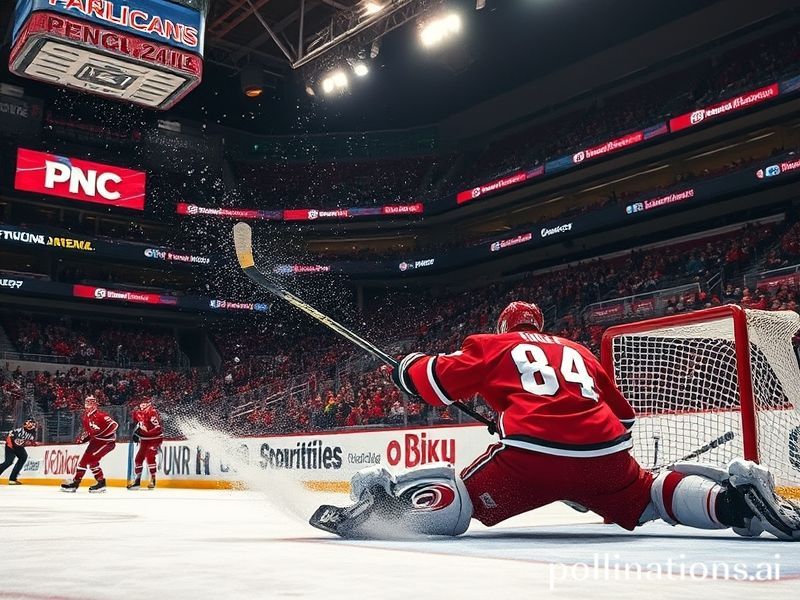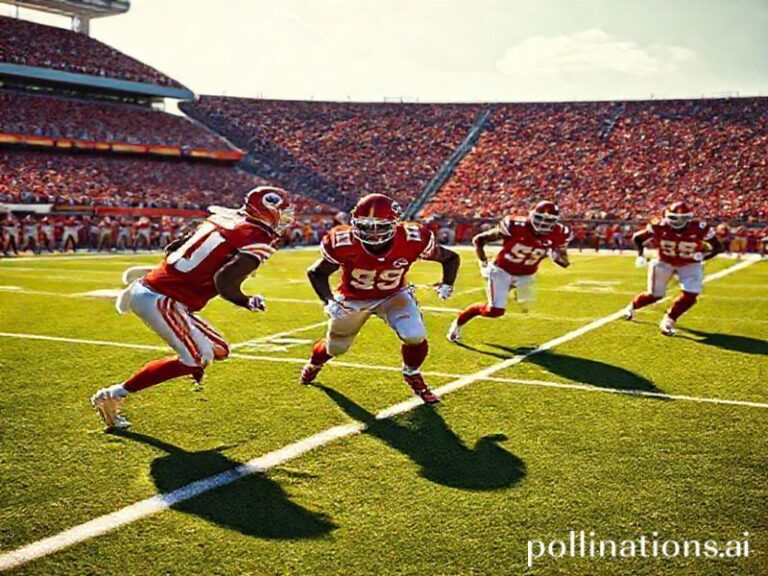Global Meltdown: How the Carolina Hurricanes Accidentally Became the World’s Climate Mood Ring
Carolina Hurricanes: How One Hockey Team Became the World’s Most Honest Weather Report
By Our Man in the Cheap Seats, Raleigh-to-Riyadh Bureau
RALEIGH—While the United Nations bickers over comma placement in yet another climate communiqué, the Carolina Hurricanes have quietly solved global forecasting: simply name the phenomenon after your hockey club and watch the planet do the rest. This week’s opening-round playoff loss to the New York Islanders didn’t merely bruise local egos; it confirmed what diplomats from Jakarta to Johannesburg have long suspected—Mother Nature has adopted an NHL marketing strategy and is running it flawlessly.
Consider the symmetry. In Manila, residents now track typhoons with the same fatalism Raleigh fans reserve for overtime. In Athens, wildfires are discussed like third-period collapses: “Well, they had the lead, then they tried defending it.” And in Siberia, where permafrost is auditioning for the role of “former permafrost,” locals shrug and mutter, “Typical Hurricanes third line—just when you think it’s solid, it disintegrates.” The metaphor has gone viral, proving that when the world needs gallows humor, it looks not to policy papers but to professional sports, that great planetary mirror in which we all look slightly ridiculous.
The Hurricanes franchise, bless its meteorologically confused heart, has become a geopolitical Rorschach test. European climate ministers cite the team’s decade-long habit of regular-season competence followed by postseason cardiac arrest as empirical evidence that hope itself is carbon-intensive. Meanwhile, Chinese state media—never missing a chance to dunk on American instability—ran a subtitled highlight package titled “Capitalist Hockey Team Demonstrates Inevitable Systemic Failure.” The segment ended with a smug infographic: “In China, hurricanes are not allowed to lose.” Somewhere in Beijing, a bureaucrat took a victory lap for weather control.
Back in North Carolina, Governor Roy Cooper’s office issued a statement urging citizens to “remain calm” after the elimination game, which is the same phrase used for literal hurricanes, gas shortages, and the time the state accidentally outlawed air conditioning. The press release might have been ghostwritten by Henrik Lundqvist; it promised resilience while sounding suspiciously like the concession speech it actually was. International observers noted the elegant bilingualism: “We will rebuild” translates seamlessly into “Wait till next year.”
Yet the broader significance lies not in Raleigh’s heartbreak but in the way the entire planet now consumes it. Brazilian TikTokers splice clips of Andrei Svechnikov whiffing on an open net with footage of Amazon deforestation, set to a mournful bossa nova remix titled “We Can’t Finish Anything.” German energy analysts have adopted the Hurricanes’ power-play percentage as a benchmark for renewable reliability; anything below 22% is now jokingly referred to as “entering Carolina territory.” Even the Kremlin got in on the act: when asked why Russian oil revenues missed targets this quarter, a spokesman sighed, “We pulled a Hurricanes—dominated possession, forgot to score.”
This is the world we’ve built: one where a regional ice-hockey franchise ends up explaining everything from supply-chain snarls to the collapse of the Antarctic ice shelf, all because humanity collectively decided that metaphors are cheaper than action. The Hurricanes themselves seem vaguely aware of their accidental ambassadorship. Team captain Jordan Staal, when pressed by a Finnish reporter about the geopolitical symbolism of his line’s minus-3 rating, replied, “We’re just trying to get pucks deep.” Translation: we have no plan, but we’re sticking to it. Somewhere, the ghost of every climate summit applauds.
And so, as the 2024 playoffs continue without them, the Carolina Hurricanes drift into the offseason like a tropical depression downgraded to “disturbance,” a perfect meteorological metaphor for our era: not catastrophic enough to warrant emergency measures, just persistent enough to ruin the picnic. The rest of the globe will keep watching, half in sympathy, half in recognition. Because if a hockey team in the American South can become shorthand for planetary anxiety, we are all—every last one of us—already on the roster. Skate, rinse, repeat.







